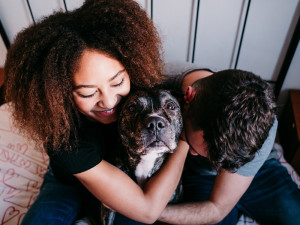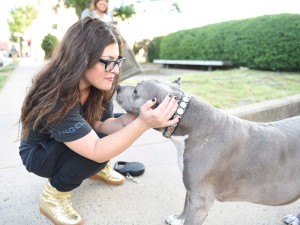BSL is Just Plain BS
Breed-specific legislation has profound impacts on families, their dogs, and animal welfare professionals.

share article

Your pet wants you to read our newsletter. (Then give them a treat.)
Early in my animal sheltering career, I worked for a shelter in a city with BSL, or breed-specific legislation. In this particular city, dogs who were considered “Pit Bulls” were banned, causing families to either hide them from the public eye or move out of the city. Inevitably, lost Pit Bull-type dogsopens in a new tab would end up in the shelter and I had the heartbreaking task of letting owners know they could not get their dog back if they lived within the city limits. Even worse, their loved family dog was at risk of euthanasia if we were unable to transport them to a shelter in another community. Splitting up families for no reason other than the large, square head on their dog was part of my job. BSL has profound impacts on families, their dogs, and animal welfare professionals.
What is BSL?
Breed-specific legislation is any policy that prohibits or significantly restricts a breed or breeds of dogs. While “Pit Bulls” are not technically a breed, the five breeds that have large heads (American Pit Bull Terriers, American Staffordshire Terrier, Staffordshire Bull Terrier, American Bulldog, and American Bully) have been the target of these discriminatory policies for the past 20 or more years. It’s important to remember that BSL can impact any breed and in the past has targeted German Shepherds, Rottweilers, Doberman Pinchers, Chow Chows, and others.
While some policies outright ban dogs of a specific breed (or assumed breed), others may have special requirements such as a mandate that the dog wear a muzzle in public, or their families may be required to pay more in renter’s and homeowner’s insurance, or a property owner may prohibit against certain breeds of dog entirely.
Why BSL is BS
The American Veterinary Medical Association, American Veterinary Society of Animal Behavior, Centers for Disease Control, National Animal Control Association, and thousands of local and national animal welfare organizations oppose BSL. Here’s why:
Identifying dog breeds based on the way a dog looks is not reliable, even among animal professionals: A study showed that when shelter staff assigned a label to a mixed breed dog, they were wrong 75% of the time. It’s not because shelter staff don’t know their breeds. It’s because dog breeds are incredibly difficult to identify based solely on the way a dog looks.
A dog’s breed is not a reliable indicator of their behavior: In fact, less than 1% of a dog’s 20,000 genes determines their physical appearance. Mixed breed dogs are not a member of any one breed and will have a unique genome.
BSL not only discriminates against a dog, regardless of their behavior history, but it also discriminates against their owners: In fact, historians have noted that BSL has roots in racism, giving white people a tool to keep People of Color out of certain neighborhoods by banning their dogs. A study in Denver, CO, showed that the highest rate of enforcement of the city’s decades-long BSL policy was in areas where racially diverse communities intersected with predominantly white neighborhoods and Miami-Dade’s Pit Bull ban came as there was growing tension around Cuban immigration.
It’s not effective: In cities with BSL, there is no evidence that dog bites reduced over time. In fact, by outlawing certain dogs, their owners are forced to hide them, restricting their access to veterinary and behavioral resources and socialization, which may increase the risks of bites for some individual dogs over time.
It costs millions of dollars to enforce: The same study in Denver, CO determined the city had spent over $100 million dollars to enforce BSL over 30+ years and that, despite its cost, showed no measurable improvement in public safety.
It causes immense stress for animal welfare professionals, who are forced to enforce the law: Whether enforcement falls to animal control officers, local law enforcement, veterinary staff, or animal shelter and rescue staff, separating families from their dogs or being required to euthanize an otherwise social, happy family pet can be devastating to our mental health.
What Policies Do Work?
Fair and breed-neutral policies that support dog owners in providing the best behavioral resources for their dog. Let’s say a dog escapes from a newly damaged fence and bites someone who is trying to catch him. The most effective solution is to help an owner reinforce the fence, or install a moveable tie down where the dog can move freely in the yard when he/she is outside but can’t jump over a fence.
Access to behavioral resources is overwhelmingly reserved for middle- and upper-class families. Cities would be much better off investing money in providing free and accessible behavioral safety nets.
Any dangerous dog policy should be based on a dog’s behavior, not how they look, and the interpretation of that behavior should be left to experts who can discern a one-time issue that is unlikely to occur again from a situation where people or pets may be in danger in the future.
How Can You Help?
Advocate for breed-neutral policies. Public safety is important and any dog that has caused damage to people or other animals should be prevented from doing it again. This may look like a requirement that a dog with a serious bite history receive behavior modification and support, or to be trained to wear a basket muzzle when in public. But these policies should always be backed by science and elected officials should be required to regularly measure whether a policy is effectively improving public health without discriminating against certain dogs and their families.

Lindsay Hamrick, CPDT-KA
Lindsay Hamrick lives in New Hampshire with her three dogs, chickens, and an assortment of rotating foster animals. She forces her elderly chihuahua, Grandma Baguette, on overnight backpacking trips, can diaper a lamb with one hand, and while she’s a long-time Certified Professional Dog Trainer, 66.7% of her dogs still won’t lay down when asked.
Related articles
![Couple hugging their Pit Bull]() opens in a new tab
opens in a new tabWhat Is a Pit Bull, Exactly?
Everything you need to know about the five breeds dubbed “Pit Bulls.”
![Couple hugging their pit bull]() opens in a new tab
opens in a new tabThe Good Fight: New York Takes Steps to Squash Breed-Specific Legislation
Under the new animal-welfare laws, insurers will no longer be able to discriminate against pet parents of certain dog breeds.
![Rebecca Corry with her dog]() opens in a new tab
opens in a new tabComedian Rebecca Corry Stands Up for Pit Bulls
“Comedy and entertainment — that’s my passion. But my purpose in life is saving dogs. And somehow I have managed to combine the two.”
![Happy lesbian couple cuddling on the couch with pet dog]() opens in a new tab
opens in a new tabGuess Which Shelter Dogs Make Great Service Dogs
Loyal, devoted, and dutiful, Pit Bulls are proving to be pretty well suited to helping humans in need.



